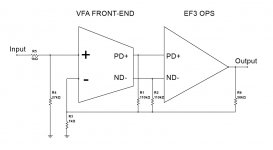I've actually been wanting to try to design an integrated amp with rail disconnects and speaker protection on board. Just plug in a single connector to a microcontroller and go. They work well as is with rail disconnects on the supplies and speaker protection at the binding posts, but it would be neater still with it all self contained. I'm getting my aluminum anodizing system perfected first, then I might work on something like this.
I have 3 redesigned IPS's (maybe 4)
-Spook V2
-SG-1 (V1)
-Kypton V 2.0 (I will do this one anally) I want to hear it !!
I might play with this :
- CFA-X V2 with a hawksford that will clip like the ND. I will
make the main input pair self clamping , eliminating the typical over-current
"Achilles heel" of this design.
Then out of these , pick 2 to integrate.
OS
OS
Thanks☺
Could you also remove the cascode from input and VAS?
Kim
You could , but lose 20db PSRR. Input pairs would then run on full
rail without the 12V shunt regulators.
You could also omit the servo - run a blocking cap.
You would then have the IPS they use in cheap chinese subs 😀 .
OS
I have actually come to an interesting observation, experimenting with the nested feedback (works well, as soon as OPS is low-distortion enough). IPS is a fast VFA.
Leaving only about 6db for the global loop, I have the output impedance increased (comparing to the normal setup, where most of the NFB is provided by the global loop).
This makes the bass sound "smoother" and somewhat ... nicer. It looks like some speakers like to have some freedom - too much damping make the sound somewhat "dryer".
I really like the way it sounds.
Leaving only about 6db for the global loop, I have the output impedance increased (comparing to the normal setup, where most of the NFB is provided by the global loop).
This makes the bass sound "smoother" and somewhat ... nicer. It looks like some speakers like to have some freedom - too much damping make the sound somewhat "dryer".
I really like the way it sounds.
TMC is a nested FB loop and the Kypton V has a local feedforward loop
within the differential.
Those error correcting OPS's also have a local loop within the main loop.
I suppose we could discount any loop within single or pairs (baxandall/hawksford) plus miller or degeneration itself as "nested".
OS
within the differential.
Those error correcting OPS's also have a local loop within the main loop.
I suppose we could discount any loop within single or pairs (baxandall/hawksford) plus miller or degeneration itself as "nested".
OS
I have built the V2 and with the help of very generous forum members like you.How was the sound of Kypton-V? Was this the one you thought sounded tube like? I never did build this one.
Here is my build
Input caps Mundorf supreme
Psu caps Mundorf Mlytic AG total 60000uf
Interconnect Van Den Hul First Ultimate > pure carbon interconnect can transmit as low as 2pico Ampere of current and speaker cables Van Den Hul Magnum Hybrid
Speakers: Magnepan
Discrete R2R ladder DAC
Actually the system is quite flat in the response.
Overall sound impression is very good its not substitute for tube like but has got some sort of tube signature and yet solid state kind of firmness.
Female Vocals: Are excellent in deed. The main vocal difference happened when I used Nichicon ES Bipolar at the negative leg of the feedback loop.
Male Vocals: have body but not authority or too aggressive nature.
Bass: Has got nice layers. It is not striking in dynamics but it does has very nice ability to distinguish layers rather than getting confused.
Treble: very much extended and resolved. But its not electrifying like what you generally observe in trance music.
Overall its very good but believe me even the leds at the input made big difference from various manufacturers. Probably the system has got nice quality components to leverage the potential of the circuit.
Im somehow have a feel that people at sansui has done something very unique in the early designs for the input stage. Many of my friends always said that sansui had some distinct signature and yes im now hearing it.
Im thinking to add the advanced wilson current mirror at the input. I think it might improve the distortion figure but how does it sound is a question. If anybody might have tried advanced wilson current mirror then just post your opinions on it. Does it requires matching?
Complex current mirrors in the LTP rarely provide any performance gain. Usually the best option for measured performance is a plain BC5xxC or BC3x7-40 current mirror with some degeneration to reduce noise.
I have 3 redesigned IPS's (maybe 4)
-Spook V2
-SG-1 (V1)
-Kypton V 2.0 (I will do this one anally) I want to hear it !!
I might play with this :
- CFA-X V2 with a hawksford that will clip like the ND. I will
make the main input pair self clamping , eliminating the typical over-current
"Achilles heel" of this design.
Then out of these , pick 2 to integrate.
OS
OS
I really look forward for SG pcb and how the finally sound quality would end with☺
This could replace my kypton C Ips☺
OS What do you think about inputstage with folded cascode, do you think the sound is more clean than trational inputstage?
TMC is a nested FB loop and the Kypton V has a local feedforward loop
within the differential.
Those error correcting OPS's also have a local loop within the main loop.
I suppose we could discount any loop within single or pairs (baxandall/hawksford) plus miller or degeneration itself as "nested".
OS
Pete, that's right, but TMC is (deliberately) frequency-dependent.
Yes, there are lots of local loops within any design.
What I mean is dividing the overall loop gain between the global loop and the one, covering IPS+VAS only - see the picture.
Attachments
kypton v new test on dummy load
My test setup changed again(now an 6 ohm dummy load is used).I must run all these from the start.
Let's start testing Kypton v
Keep in mind,amplifier under test is connected(mono) in the LEFT channel
My test setup changed again(now an 6 ohm dummy load is used).I must run all these from the start.
Let's start testing Kypton v
Keep in mind,amplifier under test is connected(mono) in the LEFT channel
Attachments
-
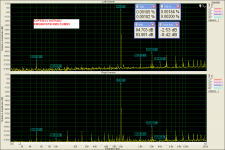 KYPTON V 20V.PNG97 KB · Views: 444
KYPTON V 20V.PNG97 KB · Views: 444 -
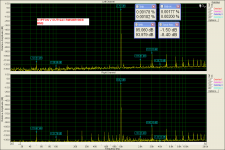 KYPTON V 24V.PNG97.2 KB · Views: 440
KYPTON V 24V.PNG97.2 KB · Views: 440 -
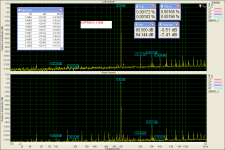 KYPTON V 112 DET.PNG103 KB · Views: 426
KYPTON V 112 DET.PNG103 KB · Views: 426 -
 kypton v.PNG19.4 KB · Views: 193
kypton v.PNG19.4 KB · Views: 193 -
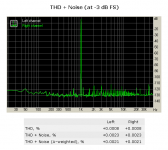 thd.PNG23 KB · Views: 157
thd.PNG23 KB · Views: 157 -
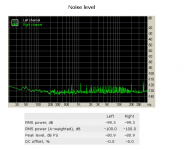 noice level.PNG23.7 KB · Views: 163
noice level.PNG23.7 KB · Views: 163 -
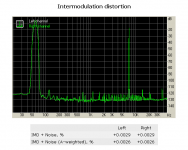 intermodulation distortion.PNG22.6 KB · Views: 153
intermodulation distortion.PNG22.6 KB · Views: 153 -
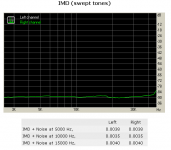 imd.PNG15.3 KB · Views: 169
imd.PNG15.3 KB · Views: 169 -
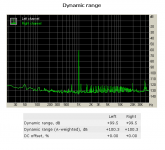 dynamic range.PNG23.7 KB · Views: 166
dynamic range.PNG23.7 KB · Views: 166 -
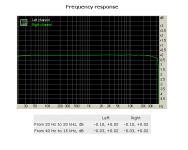 frec res..PNG19.8 KB · Views: 408
frec res..PNG19.8 KB · Views: 408
Last edited:
My test setup changed again(now a dummy load is used).I must run all these from the start.
Let's start testing Kypton v
Looks excellent, but what is the output power?
Thimios, can you please run it at 50W (20V RMS @ 8 ohm)?
Pictures 1,2,3 ,look the red words.Looks excellent, but what is the output power?
Thimios, can you please run it at 50W (20V RMS @ 8 ohm)?
1)67W/6 ohm
2)96W/6 ohm
3)112W/6 ohm
Sorry i haven't any 8 ohm dummy load.🙁
Last edited:
Pictures 1,2,3 ,look the red words.
1)67W/6 ohm
2)96W/6 ohm
3)112W/6 ohm
Sorry i haven't any 8 ohm dummy load.🙁
Ah ok - I did not look carefully 🙂 That's good

Vindicator -
All those CFA weaknesses - GONE !!
A CFA that is -
- up to -150db PSRR.
- sub to single digit THD.
-easy to servo
- The thermal stability should exceed the "Blameless".
I can't call this new TIS a "Sam Groner" TIS !!!
Glen Kleinschmidt got to this way before Sam did. (Sam stated he
knows of no prior art ?? ) Well , there is.
A New Topology For A Current Feedback Amplifier
All sorts of gems in the parent directory.
(below) - THIS CFA is 12V powered , can be kept low current behind
any shunt regulator - ALL of it. (Super low VFA beating PSRR).
If it fluctuates thermally , it wont affect the "Groner/Kleinschmidt" TIS.
It's not loaded - at all ..... by the second TIS.
The rail powered TIS is ground referenced for complete ripple cancellation.
This IPS actually exceeds -150db PSRR at 1K!
OS
All those CFA weaknesses - GONE !!
A CFA that is -
- up to -150db PSRR.
- sub to single digit THD.
-easy to servo
- The thermal stability should exceed the "Blameless".
I can't call this new TIS a "Sam Groner" TIS !!!
Glen Kleinschmidt got to this way before Sam did. (Sam stated he
knows of no prior art ?? ) Well , there is.
A New Topology For A Current Feedback Amplifier
All sorts of gems in the parent directory.
(below) - THIS CFA is 12V powered , can be kept low current behind
any shunt regulator - ALL of it. (Super low VFA beating PSRR).
If it fluctuates thermally , it wont affect the "Groner/Kleinschmidt" TIS.
It's not loaded - at all ..... by the second TIS.
The rail powered TIS is ground referenced for complete ripple cancellation.
This IPS actually exceeds -150db PSRR at 1K!
OS
Attachments
OS, I've improved those models quite a bit. There will likely be more improvements in the future. See my previous post:
http://www.diyaudio.com/forums/solid-state/248105-slewmaster-cfa-vs-vfa-rumble.html#post4655458
http://www.diyaudio.com/forums/solid-state/248105-slewmaster-cfa-vs-vfa-rumble.html#post4655458
All those CFA weaknesses - GONE !!
What about the Slew Rate weakness as pointed by astx?
I would give it a listen before you decide it is a weakness.
Of course, even if it (the SR) is indeed a weakness, there may be more strength that will outperform the weakness...
But I expect a minimum of 60V/uS...
But whatever, I will still build it anyway...
Thimios what is the problem with the Noise why is noise so dominant? Is there a capacitance multiplier for the ip and vas stage?My test setup changed again(now an 6 ohm dummy load is used).I must run all these from the start.
Let's start testing Kypton v
Keep in mind,amplifier under test is connected(mono) in the LEFT channel
All slew limiting is not equal. For a cascode to slew limit is different from a common emitter stage to slew limit, and so on... What happens during slewing has a highly variable effect on small-signal behavior depending on topology, from almost zero to dominating the harmonics. If high slew rate amps sound better I think it is probably because those specific topologies need to have a high slew rate (IE high TIS bias or indefinite drive capability) to overcome flaws in the topology.
- Home
- Amplifiers
- Solid State
- Slewmaster - CFA vs. VFA "Rumble"
